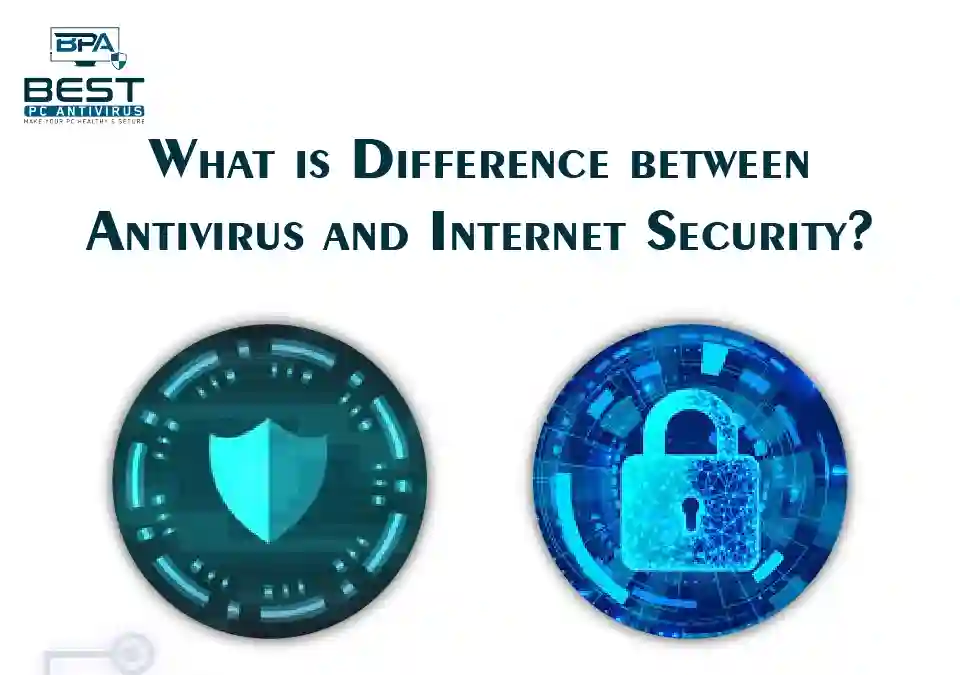In this blog post, we will be discussing the difference between antivirus and internet security software. While both types of software aim to protect your computer or device from various types of threats, they have different features and functionalities. Antivirus software is designed to protect your computer from viruses, malware, and other types of malicious software that can infect your computer. On the other hand, Internet Security software is designed to provide a comprehensive level of protection against a variety of online threats. We will also discuss the features of internet security software and antivirus software and compare their pros and cons to help you choose the right software for your needs.
Explaining the Difference Between Antivirus And Internet Security Software
Antivirus and Internet Security software are two different types of software that are designed to protect your computer or device from different types of threats. While both are designed to protect your computer, they have different features and functionalities.
Antivirus software is designed to protect your computer from viruses, malware, and other types of malicious software that can infect your computer. It scans your computer in real-time and detects any threats that are present. Once it detects a threat, it isolates and removes it from your computer. Antivirus software typically provides basic protection against threats and is focused on keeping your computer safe from known and unknown viruses.
On the other hand, Internet Security software is designed to provide a comprehensive level of protection against a variety of online threats. In addition to the features provided by antivirus software, Internet Security software includes additional features such as a firewall, spam filter, parental controls, and privacy protection. It is designed to protect your computer from online threats such as phishing scams, spyware, adware, and other types of online threats. Internet Security software provides advanced protection against online threats and is focused on keeping your computer and online identity safe.
In summary, while antivirus software provides basic protection against viruses and other types of malware, Internet Security software provides comprehensive protection against online threats such as phishing scams, spyware, and adware. Both types of software are important in keeping your computer safe, and it is recommended to use both antivirus and Internet Security software for optimal protection.
What is an Antivirus & How Does it Protect Your Device?
An antivirus is a type of software designed to protect your device from malicious software or malware, which includes viruses, trojans, worms, spyware, adware, and other types of harmful software. The main purpose of an antivirus is to detect, prevent, and remove malware from your device.
Antivirus software uses various techniques to protect your device from malware. The most common technique used by antivirus software is signature-based detection. This technique involves comparing files on your device with a database of known malware signatures. If a match is found, the antivirus software will alert you and quarantine or remove the infected file.
Another technique used by antivirus software is behaviour-based detection. This technique monitors the behaviour of software on your device and can detect suspicious or malicious behaviour that may indicate the presence of malware. This technique is useful for detecting new or unknown malware that may not yet have a known signature.
Antivirus software can also protect your device by scanning incoming and outgoing email messages and attachments, blocking malicious websites, and alerting you if you are about to download a potentially harmful file.
Overall, an antivirus is a crucial tool for protecting your device from malware and keeping your personal information and data safe. It is important to keep your antivirus software up-to-date and to run regular scans to ensure that your device is protected from the latest threats.
What is an Internet security & How Does it Protect Your Device
Internet security software is a program designed to protect your device from various online threats such as viruses, malware, spyware, ransomware, phishing attacks, and more. It provides a higher level of protection compared to antivirus software, as it not only scans for malware but also includes features to protect your online activities.
Here are some of the features of internet security software and how they protect your device:
Firewall: A firewall is a feature that monitors the traffic coming into and going out of your device. It blocks any unauthorized access to your device from the internet, keeping your personal information safe from hackers.
Anti-Phishing: Phishing is a type of cyber attack where scammers attempt to trick you into giving them your personal information, such as passwords or credit card numbers. Internet security software can detect phishing attempts and block them before they can do any harm.
Email Protection: Internet security software can scan your email for any malicious attachments or links that may contain malware.
Parental Controls: Many internet security software programs include parental controls, allowing you to restrict access to certain websites and content, keeping your children safe while online.
VPN: A virtual private network (VPN) is a feature that encrypts your internet connection, making it more secure and private. This is particularly useful when using public Wi-Fi networks, which are often unsecured and open to hackers.
Comparing the Pros & Cons of Antivirus vs. Internet Security Programs
Antivirus and internet security programs are two types of software that help protect your device from malware and cyber threats. Antivirus software is focused primarily on detecting and removing viruses, while internet security programs offer a wider range of features to safeguard your online activity.
One of the main advantages of antivirus software is its simplicity. It is designed to scan your system for viruses, trojans, and other types of malware and remove any that are found. This can be useful for users who want a straightforward solution for protecting their devices without having to worry about other online security threats.
However, antivirus software has limitations when it comes to protecting against other types of cyber threats, such as phishing attacks and identity theft. This is where internet security programs come in. In addition to antivirus protection, they also provide features such as firewall protection, email protection, and web browsing protection. These features work together to safeguard your online activity and help prevent cyber attacks.
One potential disadvantage of internet security programs is that they can be more complex and resource-intensive than antivirus software. This can make them slower and more difficult to use for users with older or less powerful devices. Additionally, some internet security programs may have more features than a user needs, which can make them more expensive than antivirus software.
Overall, the choice between antivirus and internet security software depends on your individual needs and the level of protection you require. Antivirus software may be sufficient for users who primarily use their device offline and are not heavily involved in online activity, while internet security programs may be more suitable for users who frequently use the internet and want comprehensive protection against a range of cyber threats.
FAQs
What is the main purpose of antivirus software?
The main purpose of antivirus software is to detect, prevent, and remove malware from your device.
How does antivirus software protect your device?
Antivirus software uses various techniques to protect your device from malware, including signature-based detection, behaviour-based detection, scanning incoming and outgoing email messages and attachments, and blocking malicious websites.
What is the main purpose of internet security software?
The main purpose of internet security software is to protect your device from various online threats, such as viruses, malware, spyware, ransomware, phishing attacks, and more, while also providing a higher level of protection compared to antivirus software.
What are some of the features of internet security software?
Some features of internet security software include a firewall, anti-phishing, email protection, parental controls, and VPN.
What are the differences between antivirus and internet security software?
Antivirus software is focused primarily on detecting and removing viruses, while internet security programs offer a wider range of features to safeguard your online activity, including antivirus protection, firewall protection, email protection, and web browsing protection.
Read More : Cyber Fraud Trends in 2023




